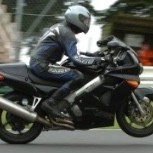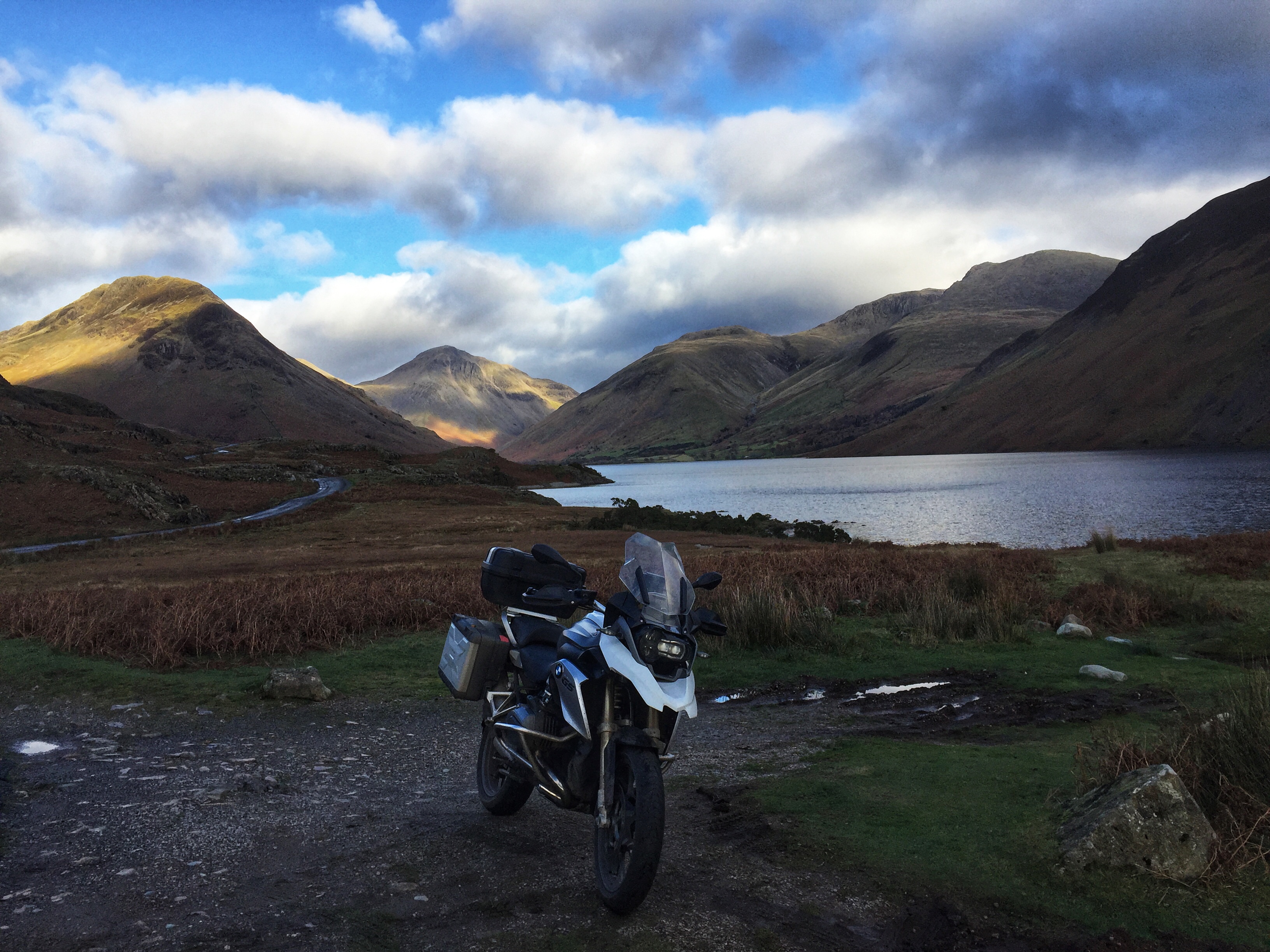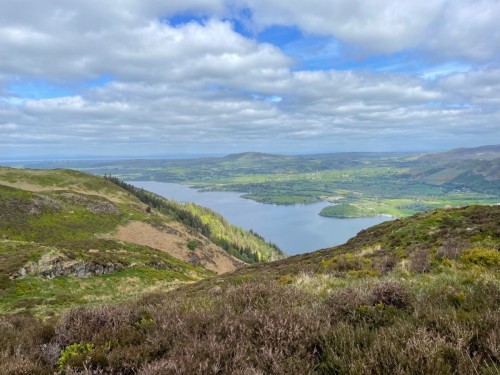-
Posts
2,048 -
Joined
-
Last visited
-
Days Won
40
Steve_M last won the day on March 23
Steve_M had the most liked content!
Personal Information
-
Bike(s)
BMW R1200GS
-
Location
Near Brampton, Cumbria.
Additional info
-
Interests
DIY (retirement project is restoring a 400+ yr old farmhouse), Judo, Gardening
-
Youtube
https://youtube.com/channel/UCZU1cmY4IOLPx7ASlaVdIVw
Recent Profile Visitors
The recent visitors block is disabled and is not being shown to other users.
Steve_M's Achievements
2.8k
Reputation
-

Time for new textiles - Oxford Montreal?
Steve_M replied to Steve_M's topic in Clothing, Luggage, Accessories and Security
I have a set of Heine Gerricke mesh textiles for very warm weather. They’re provided with a waterproof liner to zip in, and it is showerproof. Great for summer day rides. The problem arises when touring that it’s possible to pass through several micro-climates / regions over the course of a day’s ride. On the one tour we did where I wore this kit we found stopping to put on / take off the waterproof kit / liner for short showers frustrating. Particularly for my good lady pillion in her laminated waterproof kit who could weather the showers we encountered without needing to put on her waterproof over suit (actually, Berghaus walking over trousers and Heine Gerricke waterproof top). -

Time for new textiles - Oxford Montreal?
Steve_M replied to Steve_M's topic in Clothing, Luggage, Accessories and Security
Thank you. It would be the Montreal 4 that I’d be looking at. We always carry waterproof over jacket / trousers when touring. I’m more than happy if the kit keeps me dry for, say, 20 minutes until I find a place to put the outer waterproofs on. Hopfully the design update addresses the ventilation. -
Disappointingly my Wolf textile kit is no longer fit for purpose. A knee protector in the trousers has come adrift despite attempts to stitch it in place - and they no longer fit. The jacket’s ok - not as waterproof as I would ideally like, though. Wolf appear to have gone out of business, I would have bought new trousers that fit to replace my current ones. Hence I’m looking for new - budget* - kit. I intend to ride up to Glasgow to look in Infinity and Sportsbikeshop to see which product to buy. 2 reasons for the trip. 1. I’m not confident I would get the right size online so checking fit and features in person, so to speak, is my approach. 2. Ignoring the M74, there are some cracking roads to get to Glasgow from here. I’m still narrowing down which I think might work for me but currently in pole position is the Oxford Montreal textiles. Does anyone have any experience of these? *Normally I’d be tempted to hang the cost but two stock market shocks, one domestic, one international, have impacted these pensioners pots.
-
Let me know if you found it useful, please,
-
I don’t know your location. This course, Essex Firebikes, is well worth considering. I haven’t done the Firebikes course but I have done something very similar and the instructors overlap with the course I’ve done - I’d hazard a guess that the itinerary is much the same.
-
Hello and welcome from this Norfolk refugee.
-
That was one for next year. Not happening unless something changes (I quite fancy buying an old Triumph Spitfire to do it then flog it afterwards).
-
Back in the dim and distant past I became an observer for the IAM. Many riders who came along for our try-out days had similar concerns. I would recommend taking additional training with a reputable organisation, whether IAM, RoSPA, Rapid Training, i2i, Zen school of motoring (he also instructs for Hopp at Cadwell).
-
I do hope that rule doesn’t apply to pillions filming. Grossglockner
-
Our two trips taking in Austria have been in September. We both wore textiles and carried spare layers (as we also enjoy walking the fells of Cumbria , these layers tend to be the same as we wear for walking). Each time we have got sodden on the Gerlos, requiring donning waterproofs, and the Grossglockner was closed due to snow on one occasion.
-
Taken from a Facebook post… ”*** TIPS ON TUESDAY *** When others make mistakes Part 2 The human condition is to make errors. None of us are perfect, and we have to expect others to make mistakes. Since we share the road, we need to anticipate driving errors, but even more importantly, we need to avoid the adverse psychological effects of high-stress events such as confrontations and road rage when drivers around us put us at risk. Riding while angry triggers the body’s fight‑or‑flight response, elevating heart rate and stress hormones. Anger impairs judgment and promotes deliberate risky behaviours like running red lights, tailgating, dangerous overtaking, aggressive swerves, even brake-checking, substantially raising the likelihood of collisions. One of my video nasty YouTube shorts showed a rider brake-checking a car and getting knocked off by the driver who clearly wasn't expecting the bike suddenly slow down. That was hardly a well-judged manoeuvre. The fact is, riding angry doesn't solve any issues and almost always makes things worse, because our own reaction to a mistake in turn frequently provokes retaliation from the other road user who sees our response as uncalled for. The situation rapidly escalates, potentially into a violent confrontation. People are killed in road rage incidents. WHY ASSUME OTHERS ARE 'OUT TO KILL US' - "Treat other road users like they're out to kill you." I've lost count of how many times I've heard that since I first heard it from a police biker running a safety course back in the early 80s. It's actually the result of a series of cognitive biases. We instinctively attribute our own successful performances to our internal qualities like knowledge, skills and effort, whilst shifting blame for failures onto external factors because we find it uncomfortable to admit our personal mistakes. This in turn makes it easier to believe someone else’s error stemmed from their own incompetence rather than the situational challenges they faced. This error leads us to judge unintended mistakes as character flaws rather than honest lapses. We remain happy to explain our own errors as “an unavoidable slip”, but when others make the same mistake we treat it as “proof of incompetence” such as when "they don't bother to look" as many believe when drivers fail to see motorcycles. On top of that, our brains weigh negative events more strongly than equally significant positive ones, so it's the errors that stand out on the roads, magnifying their impact and making us more likely to remember them as evidence of wrongdoing. We never even notice the equally-significant correct decisions that happen around us all the time. WHY OTHER PEOPLE GET ANGRY WITH US - we could start by recognising that individuals with difficulties in emotion regulation, such as those with anxiety disorders, bipolar disorder, or PTSD, may be particularly vulnerable to intense anger behind the wheel. It's been estimated that around one person in 50 have bipolar disorder. Personality disorders are estimated to affect around one in 20, and one in 4 will experience some kind of mental health issue. It's not a 'fault', it's simply the way brains are built. Think about that next time you're out on the bike. THE IMPORTANCE OF NOT RECIPROCATING - even if someone else has 'triggered' us, we can work to avoid reciprocating. Angry gestures may seem like we're making our own point about our feelings, but they are frequently interpreted as signs of disrespect - how often have you waved a fist at someone and received a blast of the horn in response? It's even worse when the 'offender' attempts to apologise first and is met with a torrent of abuse. That'll trigger me, for sure. =================== BOOKINGS NOW OPEN for the JUNE edition of the 'SURVIVAL SKILLS EIGHT-WEEK e-COURSE' Get a mix of interactive coursework, practical on-road exercises and personalised feedback as I introduce you to the 'stay out of trouble if you can, get out of trouble if you can't' Survival Skills approach to riding. Take the course in your own home, in your own time! SIGN UP IN THE ONLINE STORE: https://survivalskills.sumupstore.com/ =================== 'ZEN MOTORCYCLING' & A CALMER PATH - we can look at the concept of 'plays well with others'. This is a term originally coined in childhood education to describe cooperative play, but it applies to adult psychology too. It signifies effective communication, sympathetic perspective‑taking by imagining the other driver’s situation in order to avoid misinterpretation during high‑stress encounters, and mutual respect by cultivating empathy. It all helps disrupt the hostile attributions about how others behave that fuel anger towards others. BEATING RIDING ANGER - however 'Zen' we try to be, there will be occasions when others do put us at risk, and if we're to avoid being triggered - and I myself have had problems with this in the past - we need to gain the self-awareness that lets us recognise our rising negative emotions in order to beat them. Labelling emotions - fear, frustration and anger - can fostering a calmer, more deliberate mindset when tensions mount, and that's the first step in regulating them. Mid-ride, it can help to implement a cognitive‑behavioral strategy, such as reframing stressful traffic situations as temporary inconveniences. I have an unique approach - rather than rage at a jam that's holding me up in London, I look at architectural features on buildings. It's quite amazing what you can see if you look, and it all helps move our focus from the delay to something more entertaining. If we do get angry mid-ride, then a deep‑breathing exercise can help us return to a cooler state of mind. I've even stopped and got off the bike before now, and gone through a mind-clearing and conscious muscle relaxation regime to suppress the stress responses before resuming riding. And we can take a huge step by not going riding when we're upset. I know that some bikers genuinely believe that going for a ride on the bike is a good way to relieve stress and anger. In fact, the evidence points the other way. If we ride when upset, it impairs our impulse control and we are more likely to indulge in risk‑taking behaviours than if we cool down at home. AND IF NONE OF THIS PERSUADES YOU - and you still resist the need to 'play well with others', maybe this will. Acute spikes in stress hormones can temporarily reduce blood flow to the heart and brain, magnifying the chance of heart attack or stroke for up to two hours after an angry outburst! --------------------------------- IF YOU THINK THIS POST HIT THE SPOT please pay it forward to other bikers! “
-
Anything that improves your riding must surely be a good thing. IAM / RoSPA, Track training days (recommend Hopp Rider Training at Cadwell), machine skills courses (recommend Essex fire bike and i2i), trail riding, Motogymkhana, or just going out and practicing slow riding skills on a supermarket car park. All the best with your IAM journey. I look forward to reading how it goes. I’m particularly interested in how your observer guides you - whether prescriptive or coaching/counselling style.
-
Before I put something in the Rant thread, I’m attempting to understand what is the point of owning / using a drone other than for professional* purposes. *a broad definition but it’s the best I can come up with as a brief summary.
-
Good evening from the Lake District (still). Today we had a short, but strenuous little hike up Barf, across to Lord’s Seat and back down to Thornthwaite.




